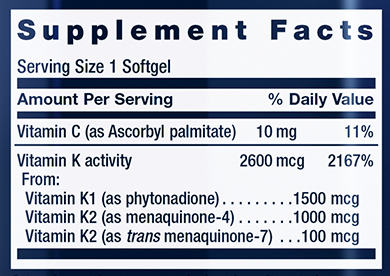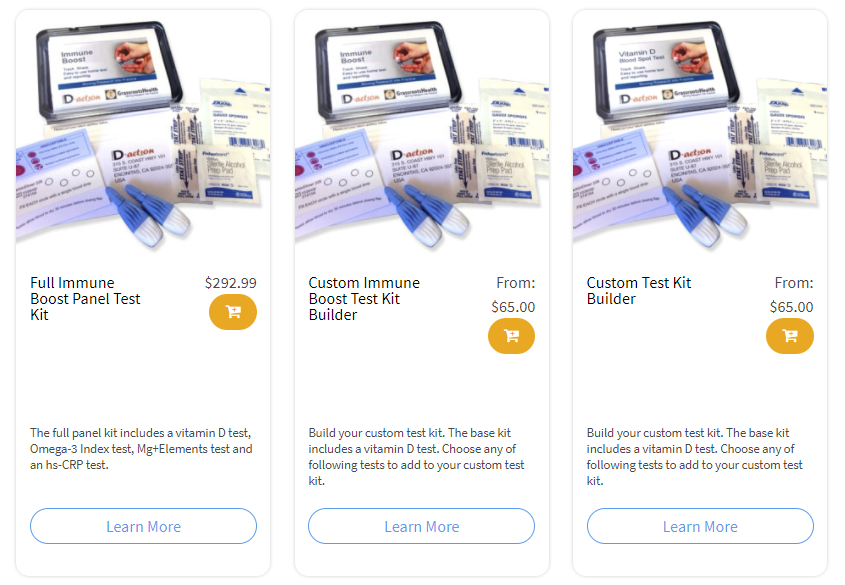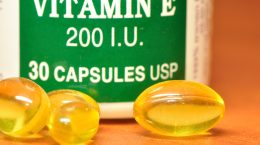Published on September 8, 2020
In a previous blog we discussed the importance of the serving size amount and suggested use directions to ensure that you get the nutrients you expect from the supplements you are taking. In today’s blog we will look at the information on vitamin K labels which can be confusing or unclear.
What is Vitamin K?
 Vitamin K, primarily known for its role in blood clotting (in fact, it gets its name from the German ‘koagulation’), is a family of compounds. There two main forms of vitamin K that play very different roles in the body.
Vitamin K, primarily known for its role in blood clotting (in fact, it gets its name from the German ‘koagulation’), is a family of compounds. There two main forms of vitamin K that play very different roles in the body.
Vitamin K1 (phylloquinone), found in leafy greens, activates proteins involved in the blood coagulation cascade causing blood to clot. Fun fact, some blood thinners (warfarin and coumadin) act by inhibiting vitamin K to keep the blood from clotting.
Vitamin K2 (menaquinone), made by bacteria and found in animal-based and fermented foods, plays a central role in calcium metabolism and is responsible for activating calcium-binding proteins (called matrix GLA proteins). These calcium-binding proteins are present in vascular smooth muscle, bone and cartilage. Vitamin K2 helps direct calcium out of the blood vessels and into the bone and may help prevent coronary artery calcification and prevent osteoporosis.
Vitamin K2 is found in several forms. Animal foods contain MK-4 while fermented foods (such as kombucha, sauerkraut and natto – fermented soy) contain MK-7 as well as MK-5 through MK-11. Vitamin K2 in dietary supplements are usually in the forms of MK-4 and MK-7, with MK-7 being better absorbed.
How does vitamin K appear on supplement labels?
Vitamin K can appear in many different ways on a supplement label, below are some of the most common ways it may appear.
Vitamin K: total vitamin K, which could be either K1 (typically) or K2 or both.
Vitamin K1: total amount of vitamin K1 (as seen on the label below). This may also include the word “Phytonadione.”
Vitamin K2: total amount of vitamin K2, which is typically either MK-4 or MK-7 or both.
Vitamin K2 as Menaquinone-4 (MK-4) and/or Menaquinone-7 (MK-7): total amount of MK-4 and/or MK-7 (as seen on the label below); the sum of these numbers is the total vitamin K2.
Vitamin K Complex: total vitamin K as a combination of K1 and K2 (a breakdown of how much of the complex is K1 vs. K2 may or may not be provided).
Vitamin K2 Complex: total vitamin K2 as a combination of MK-4 and MK-7 (a breakdown of how much of the complex is MK-4 vs. MK-7 may or may not be provided).

When filling out the GrassrootsHealth questionnaire, options are available for you to enter the totals for Vitamin K, K1, and/or K2, depending on what is on your supplement label. If your label has the amounts for MK-4 and MK-7, you can also enter these individually and provide the sum of these numbers for the total vitamin K2.
Among GrassrootsHealth participants who have previously reported their supplemental intake for vitamin K, 50% report taking vitamin K2 and 16% report taking vitamin K1. We appreciate you taking the time to enter your supplemental vitamin K intake in the questionnaire! The next part of this series will look at the information on other specific nutrient supplements.
Nutrients Work Together for Immune and Overall Health!
Do you know your own nutrient levels? Do you know your levels of inflammation? Could getting more of certain nutrients help to decrease your levels of inflammation, and improve your immune response? Find out by testing your vitamin D, omega-3s, magnesium and other essential elements (including copper and zinc), as well as your inflammation levels, with the new Immune Boost home test kit offered by GrassrootsHealth. Measuring levels is the only way to know if you are supporting your immune system and whether additional changes should be made, with supplementation, dietary changes, or both.
Enroll now with the Full Immune Boost Panel (which includes tests for vitamin D, Omega-3 Index, magnesium, zinc, selenium, copper, and hsCRP), and get 10% off when you use coupon code BoostTen at checkout.
Are You Getting Enough Vitamin D to Help Yourself?
We’re in a time of great crisis that could be greatly affected by making sure you and everyone you know has a serum level of at least 40 ng/ml. Help us help you.
Do you know what your vitamin D level is? Be sure to test today to find out, and take steps to keep it within a target of 40-60 ng/ml or 100-150 nmol/L! Give your immune system the nutrients it needs to support a healthy you and protect yourself from unnecessary diseases, especially COVID-19.
GrassrootsHealth Nutrient Research Institute has launched the new Immune Boost project with the use of our myData-myAnswers nutrient health system that over 15,000 people are already using for their health. Specific markers that influence immune health are suggested for testing as part of this project including:
- Vitamin D
- Omega-3 Index
- Essential elements magnesium, selenium, and zinc
- hsCRP
We hope to demonstrate how one can use the Nutrient Research Model established by Dr. Robert Heaney to establish the effect of vitamin D serum levels of at least 40 ng/ml (100 nmol/L) on risk reduction with different ethnicities in the population. Status and intake of other nutrients will also be analyzed for any type of relationship to immune status and symptom severity. Please let us know if you’re interested in helping sponsor this project.
CLICK HERE for updates and new information about the project.
Through GrassrootsHealth Nutrient Research Institute, you can also test your essential elements magnesium, copper, zinc and selenium, toxins such as lead, mercury and cadmium, as well as your omega-3 levels, inflammation levels and thyroid stimulating hormone (TSH) level. Find out your levels today! Log on to the test selection page (click the link below) to get your tests and see for yourself if your levels can be improved.
Make sure you track your results before and after, about every 6 months!
Click Here to Access the Test Page
How can I track my nutrient intake and levels over time?
To help you track your supplement use and nutrient levels, GrassrootsHealth has created the Personal Health Nutrient Decision System called
For each specific supplement, you can track what days you take it, how much, and many other details. This will help you know your true supplemental intake and what patterns of use work for you to reach and maintain optimum nutrient levels. Check it out today!








